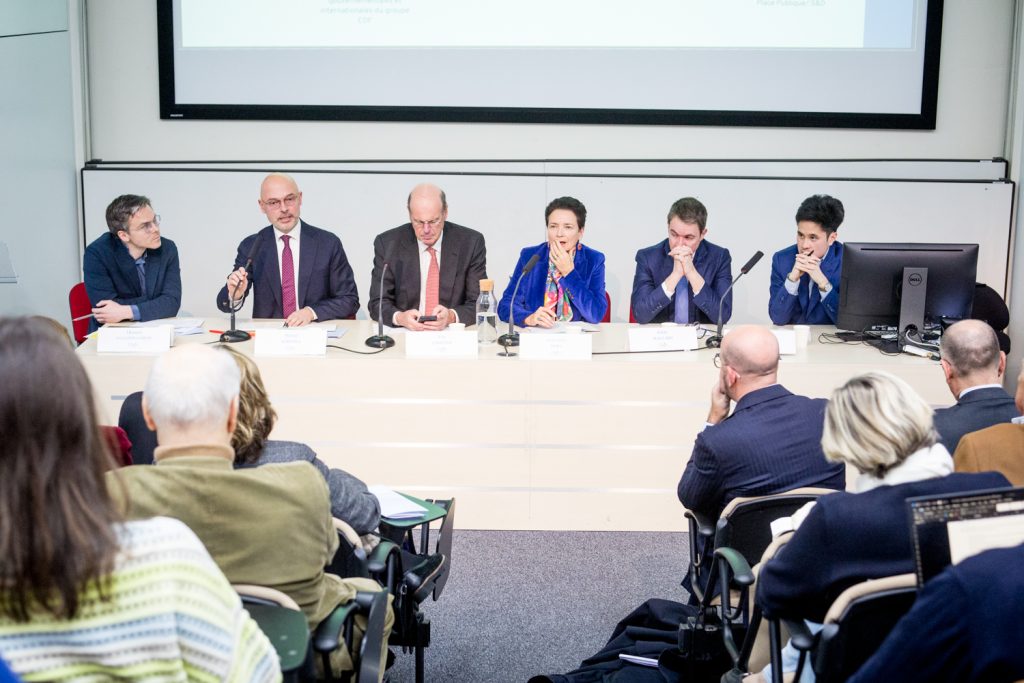[FR] What policies are needed for a prosperous and sustainable European economy?
Jacques Delors Institute Annual Conference

Moderator: Phuc-Vinh Nguyen, Head of the Energy Centre at the Jacques Delors Institute
Phuc-Vinh Nguyen opened the session by highlighting the urgent need to rethink European competitiveness through the prism of energy transition and economic sustainability. In his view, Europe must play a key role in addressing the growing environmental and geopolitical challenges.
Contributions from participants:
Shiv Someshwar, Associate Professor at Columbia University (video)
Shiv Someshwar presented an approach based on the ‘enlightened national interest’, advocating a Global Green Deal by 2025 to strengthen carbon neutrality. Inspired by the lessons of the Trump administration, he warned against a ‘zero-sum game’ mentality, which runs counter to the common good. The European carbon market, now being replicated in other regions of the world, was cited as a driver of innovation for global decarbonisation. He also called for an international meeting to be held in Paris in 2025 to define a global decarbonisation agenda that integrates the specific needs of emerging and developing economies to ensure a just and inclusive transition.
Michal Kurtyka, former Polish Minister for Climate and President of COP24
Michal Kurtyka expressed his concern about four major risks. War, now present on the European continent, which is destroying energy production factors and crippling our economy; energy dependence, which exposes Europeans to increasingly unreliable partners; disunity between Western and Central Europe, which often face different realities; and European over-regulation, also criticised in the Draghi report. He called for greater energy autonomy by reducing dependence on American gas and Chinese solar panels, while exploring diversified solutions such as nuclear power. This energy autonomy is necessary in order to preserve Europe’s credibility and international leadership on the energy transition. When asked about decoupling from Russian gas, he pointed to the lack of foresight on the part of certain Member States, such as Germany, which has benefited greatly from European solidarity in transporting non-Russian gas to its territory, while countries such as Moldova, lacking the means, remain dependent on it. This situation, in his view, requires appropriate financing, particularly from the EIB.
Erkki Maillard, Director of Government Affairs at EDF Group
Erkki Maillard emphasised the crucial role of electrification in decarbonising the economy, while lamenting that electrification has stagnated at 25%. He called for consistent taxation favouring electricity over gas and for stable long-term standards. Commending Europe for maintaining a high price per tonne of carbon, he highlighted the principle of ‘technological neutrality’ in force in the United States: the government provides tax incentives for decarbonisation and leaves the choice of means to the actors themselves. Highlighting small modular reactors (SMRs), he suggested the creation of a European electrification bank to support the energy transition of businesses and households.
Thomas Pellerin-Carlin, Member of the European Parliament (S&D)
Thomas Pellerin-Carlin compared the climate momentum of 2019, driven by climate marches, to the decline observed in 2024, marked by an alliance between conservatives and the far right against key environmental measures. He called for a coherent economic and ecological vision, stressing that Europe, the continent with the least fossil fuels, is the most vulnerable in terms of competitiveness in a fossil fuel-based system and therefore has every interest in a green energy system. Pointing to the contrast between the United States (via the Inflation Reduction Act) and China, which have ambitious investment plans, he criticised the weakness of European initiatives such as the Net Zero Industry Act, which lacks significant funding. The example of REPower EU, which had stimulated the production of heat pumps in 2022 before being abandoned in 2023, illustrated the lack of continuity in European policies.
Geneviève Pons, Director General of Europe Jacques Delors
Geneviève Pons highlighted the global impact of the European Green Deal, citing the influence of the Carbon Border Adjustment Mechanism (CBAM) on markets in India and China. She illustrated her point with the example of Mozambique, where aluminium could be produced using hydroelectric power instead of coal. She also emphasised the importance of striking a balance between regulatory ambition and bureaucratic pragmatism, which is essential for maintaining stakeholder buy-in. Finally, she highlighted the untapped potential of marine renewable energy, particularly the development of offshore wind turbines, while reiterating the need to better protect the oceans, an essential asset in the fight against climate change.
Eric Lombard, Chief Executive Officer of Caisse des Dépôts
Eric Lombard lamented the lack of consistency in European industrial and energy policies, as well as the fragmentation of financial markets, which is driving investors to turn to the United States. However, in his view, Europe has all the necessary assets: abundant savings, strong banks and confident savers. He called for a financial markets union, as recommended by the Letta report, to better direct financing towards the energy transition. On the technological front, he identified two major weaknesses: batteries, where Europe must unite to catch up, and solar panels, where a strategic partnership with China now appears essential. Finally, he reiterated that political clarity remains the key lever for effectively channelling available financial resources.









